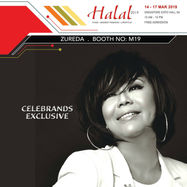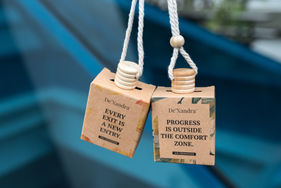
It can be difficult for entrepreneurs to decide on their first move when tapping into the Muslim market. Raudha Zaini, HalalTrip’s marketing manager, believes that a good starting point is to understand Muslims’ different levels of needs, from essentials to nice-to-haves. (Photo: Zeng Shiya)
The Muslim market: an ocean of opportunities
Halal food and drinks are necessities for Muslims but the sector is getting overcrowded. Think big. Think different. How else can businesses break in?
By: Nur Nabillah Roslee, Zeng Shiya and Norazreen binti Abd Haris
When Dr Norshahril Saat was studying in the Indonesian Ulema Council, he saw Chinese products during a meeting and wondered why they were being passed through the Indonesian market for halal certification before being exported to the Middle East.
What is certain, though, is that this proves there is a circulating global halal market, said Dr Norshahril, a fellow at the Institute of Southeast Asian Studies.
This very reason is why Azrulnizam Shah Sohaimi, executive director of the Singapore Malay Chamber of Commerce and Industry (SMCCI), encourages businesses with sufficient capital to look beyond local shores to where there is demand.
“There are now many opportunities, grants, and help for people who really want to internationalise. So if you are looking at underdeveloped regions in terms of the Muslim industry, look a little further than East Asia, such as North Africa,” he says.
CrescentRating is an example of a company reaching out beyond Southeast Asia. It started as a B2B platform focused on research, rating and consultation for tourism sectors seeking to increase their Muslim-friendliness.
They are currently expanding their reach by collaborating with Cape Town in South Africa, where the tourism board has been stepping up efforts to zone in on the Muslim market. As part of the campaign, CrescentRating held a Halal Chef World project, where 40 chefs from five-star hotels and restaurants were taught to create halal gourmet dining for guests.
Alongside collaborations with other destinations such as the Philippines and Jeju Island, these efforts are testament to a global demand for halal and Muslim-friendly products and services.
Furthermore, with multiple fairs being organised locally, Muslim-friendly commodities are gaining traction.
In the tourism industry, travel fairs provide a platform through which agencies and companies can promote their Muslim-friendly tours. The National Association of Travel Agents Singapore (NATAS), for example, organises three-day travel fairs biannually.
The recent fair held in January 2019 attracted more than 91,000 people, a 10% increase from before, said Ismail Hussain, the general manager of NATAS. He referred to these fairs as “very strong business-to-consumer playgrounds”.
Meanwhile, businesses in the food and beverage (F&B) industry can look to Seoul Garden Group’s internationalisation efforts as evidence of a profitable endeavour. Having been around since 2002, the Korean-inspired Singaporean brand has since set up outlets in Malaysia, Brunei and Indonesia.
But to target the Muslims abroad, Seoul Garden Group has to adapt to each country’s procedures for obtaining halal certification.
“In the other countries, the requirements are not so clear, unlike Singapore where there is a very good government system so applying for things is much easier,” says Andrew Lee, chief executive officer of Seoul Garden Group.
As a result, the company had to engage the help of consultants to familiarise themselves with the different requirements. This helped Seoul Garden Group recognise the dynamics of Muslim communities across the region and better cater to their customers.
The group also embarked in joint ventures with business partners in Malaysia to better adjust to the local culture and work ethic. In addition, it has specialised marketing teams in different countries.
But before deciding to internationalise, it is worthwhile for businesses to navigate into what is dubbed the “blue ocean” by Azrulnizam.
Markets with more room for growth
The “blue ocean” refers to a business strategy where entrepreneurs expand into relatively untapped markets. Examples include the halal cosmetics and pharmaceuticals industry, said Azrulnizam.
Within SMCCI alone, only 33 out of 711 members belong to the beauty and wellness sector. Conversely, 182 businesses are in halal F&B and 150 in retail.
The waves in the “blue ocean” are gentler and the water clearer, with less competitors jostling around. To capitalise on such markets, businesses can start by identifying gaps where the needs of Muslim consumers are not sufficiently met.
That is exactly what local fashion line Lullyselb did. It was founded to provide headscarves to Muslim women who wanted edgier designs that did not compromise their dress code, said its co-founder Selma Bamadhak.
Headscarves are a wardrobe staple for Muslim women but affordable statement pieces are rare. By selling headscarves printed with geometric designs or eclectic illustrations, Lullyselb stands out as a bold option for adventurous women.
But targeting the Muslim market is not synonymous with being exclusive. Muslim-friendly products can also appeal to non-Muslims. In fact, Lullyselb has had customers who use the headscarves as shawls or handbag accessories.
Leveraging on Muslim-centric platforms
Venturing into less saturated sectors is not the only way to increase sales. Methods such as participating in halal fairs can also expand the brands’ visibility.
An example is Halal 2019, which was held at Singapore Expo over the second weekend of March. It gathered the Muslim community over halal food, fashion and lifestyle products.
MegaXpress, the organiser of the fair, declined to provide the number of participating vendors. Also, since admission was free, it was tricky to estimate the event turnout.
Nonetheless, the fair was visibly popular among Malays as Hall 5A, where the event was held, was jam-packed at 4pm on a Sunday. Visitors barely had enough room barely had enough room to walk two abreast between the rows of stalls.
One vendor that stood out was Sugarbomb, a perfume company based in Shah Alam, Malaysia. A steady trickle of shoppers stopped by their booth, intrigued by a sign displayed above it that announced: “Free perfume!”
It was not a marketing gimmick as Sugarbomb gave away over 1,000 bottles of perfume in less than three days. Each bottle was thumb-sized and held eight millilitres of perfume.
This is the second time Sugarbomb has participated in a halal fair in Singapore, said its Senior Marketing Executive Mohammad Syafiq bin Yon Afrizal. After finding out about Halal 2019 through MegaXpress’ Instagram account, they took part in it to raise awareness about the brand among Singaporeans.
“We are confident with our product and we know that someday you will come to us and want to buy,” says Syafiq, explaining why they gave out free perfumes.
“If you are looking at underdeveloped regions in terms of the Muslim industry, look a little further than East Asia, such as North Africa.”
— Azrulnizam Shah Sohaimi, executive director of the Singapore Malay Chamber of Commerce and Industry
“In the past two years, we have started to take more action towards marketing and speaking to the Muslim visitors who are coming into Singapore and are trying to cater to their needs.”
— Mohamed Firhan Abdul Salam, area director (Indonesia) of the Singapore Tourism Board
Besides, fairs can also generate leads and post-event sales. Fashion and lifestyle brands at Halal 2019 capitalised on this opportunity by placing posters and giving out name cards printed with their website and social media pages.
Alas, it is not only up to individual businesses to capitalise on the growing Muslim market.
Singapore, a work in progress
Singapore Tourism Board (STB) acknowledged more can be done to promote Singapore as a Muslim-friendly destination. Admitting that the market was overlooked, an Area Director for Indonesia, Mohamed Firhan Abdul Salam, said that STB is stepping up its efforts.
“In the past two years, we have started to take more action towards marketing and speaking to the Muslim visitors who are coming into Singapore and are trying to cater to their needs,” says Firhan. The increased efforts come after the Mastercard-CrescentRating Global Muslim Travel Index (GMTI) 2018, which identified the Muslim travel market as a highly profitable industry.
STB also engaged in marketing collaborations with Indonesian companies last year. These include competitions such as the Face of Zoya and Hijab Hunt. Formatted as beauty pageants for Muslim women, the winners are featured in marketing collaterals to promote Singapore.
Although STB has just begun ramping up its efforts in attracting Muslim travellers, the city performed well on the GMTI last year. When grouped with Organisation of Islamic Cooperation (OIC) countries, Singapore tied at sixth place with Qatar. Leading the OIC countries is Malaysia, followed by Indonesia and United Arab Emirates, which are tied in second place.
Singapore was even listed as one of the top destinations for ease of access, communications and environment. But it missed the mark for enabling services which encompass Muslim-friendly amenities such as accommodations, airport facilities and prayer spaces.
With an orchid garden, entertainment deck complete with Xbox 360, Kinect stations and movie theatres, a koi pond and even a butterfly garden, Singapore’s Changi Airport has facilities that surpass the expectations of most travellers. So, it is no surprise that it is consistently ranked as one of the best in the world.

The GMTI 2018 grouped the needs of Muslim travellers into three categories, which can serve as guidelines for businesses.
Yet something is amiss at the airport which serves over 100 airlines and receives more than 65.6 million passengers — over tenfold of the city’s population. With Singapore being the most popular destination for non-OIC countries, it is puzzling why Changi Airport does not provide designated prayer rooms in its public areas.
Changi Airport Group did not respond when we reached out for more information on the matter.
Raudha Zaini, a marketing manager from HalalTrip, a B2C subsidiary of CrescentRating, said the latter has suggested for Changi Airport Group to address the lack of prayer spaces.
But she added that it is also important to understand the different categories of requirements for Muslims — “Need to Have”, “Good to Have” and “Nice to Have”. Although Muslims are required to pray five times daily, the ritual does not require a specific venue, making designated prayer rooms a “Nice to Have”.
“I was in Japan recently and even at Takashimaya, they had a prayer room and it is a very nice, open area. I was very impressed,” says Raudha.
Having Muslim-friendly facilities makes logical sense for businesses. “If you want travellers to stay longer, you create space for them, like prayer rooms, because if they have to leave and come back, it is a bit of a hassle,” says Raudha.
Ismail, who previously worked as a travel operator, compared Singapore’s efforts in seizing the Muslim market against countries like Japan and Australia. These fourth and tenth ranked non-OIC countries highlight their statuses as Muslim-friendly destinations by publishing official Muslim travel guides. In contrast, Singapore has been passive in its approach.
Reflecting on the availability of halal food almost everywhere in Singapore and over 70 mosques around the island, Ismail says: “We have everything at our doorstep but we are not telling people that we have it — and that is our shortcoming… We are Muslim-friendly and the world needs to know about it.”




